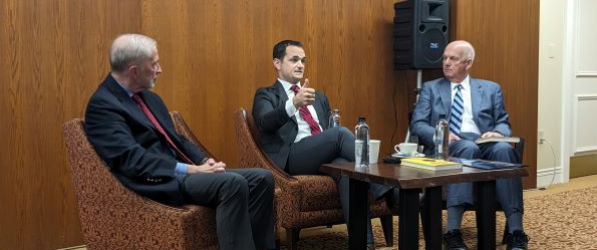Event Summary: Pitt Cyber Hosts the authors of “Battlefield Cyber: How China and Russia are Undermining Our Democracy and National Security”

On October 18, Pitt Cyber, in partnership with Buchanan Ingersoll & Rooney, hosted a panel discussion that delved into the pressing issue of cybersecurity and its implications for American democracy and national security. Moderated by David Hickton, the Founding Director of Pitt Cyber, the panel featured authors William Holstein and Michael McLaughlin, who shared their insights from their newly released book, “Battlefield Cyber: How China and Russia are Undermining Our Democracy and National Security.”
The book seeks to address the perception of many Americans that cyber incidents are isolated events, when, in fact, they are indicative of an ongoing and coordinated infiltration of our IT systems. Threat actors are lurking within our networks, including cloud computing systems, making it imperative to address these concealed dangers.
Much of the discussion focused on Chinese cyber-attacks and objectives, with the panelists shedding light on the country’s strategic long-term approach to IT infiltration. Holstein and McLaughlin identified the PRC as the most significant cyber threat, given its vast population, English language capabilities, and resources. It we stick to the current trajectory, they forecast an ongoing cyber war that would keep the U.S. off balance and prevent symmetrical retaliation. Recalling the once commonly held Western belief that China’s economic growth would eventually lead it to embrace democratic values, the authors pointed out that under Xi Jinping’s leadership, China has taken a different trajectory, actively pursuing policies that challenge U.S. democracy.
Russia, according to the authors, on the other hand, is characterized by an appetite for profit and leads the charge in ransomware attacks against U.S. companies, adding another layer of complexity to the cyber threat landscape. Authoritarian states also regularly collaborate in creating “grey zone activities,” exemplified by their support for groups like Hamas. They emphasized how both China and Russia exploit U.S. vulnerabilities through social media platforms, deepening internal divisions and sowing discord. In particular, they highlighted implications of Americans’ use of TikTok, which could be used for cognitive warfare through extensive collection of user data.
The panel also highlighted a critical disparity in how the U.S. views cybersecurity versus its adversaries. While the U.S. compartmentalizes cybersecurity functions, its cyber adversaries employ a more unified approach, with close collaboration between government and private sector actors. To address this, the panelists stressed the need for better coordination, both within the U.S. government and across the U.S. economy more broadly. They consider creation of a “cyber czar” to be a positive step, though acknowledged the position has faced challenges related to authority and overlapping responsibilities.
The authors propose the creation of a ‘Digital Services Department,’ which would have primary federal authority in driving national cybersecurity efforts. While noting initial growing pains, they praised the creation of the Department of Homeland Security (DHS) after September 11th for improving whole of government coordination on national security matters. The authors expressed concern that the current disjointed nature of federal cybersecurity efforts has impeded formulation of an effective response.
An effective response also requires strong coalitions in combating cybercrime; with industry, the public and international partners. Indictments of cybercriminals, exemplified by the 2014 case brought against PLA cybercriminals by Hickton in his then role as U.S. District Attorney for the Western District of Pennsylvania, are essential to providing the evidence to the public and allies to facilitate coalition building.
Panelists left the audience with an understanding that that the U.S. must adapt to these evolving threats, fostering better coordination, public awareness, and alliances to safeguard democracy and national security in an increasingly digital world.




